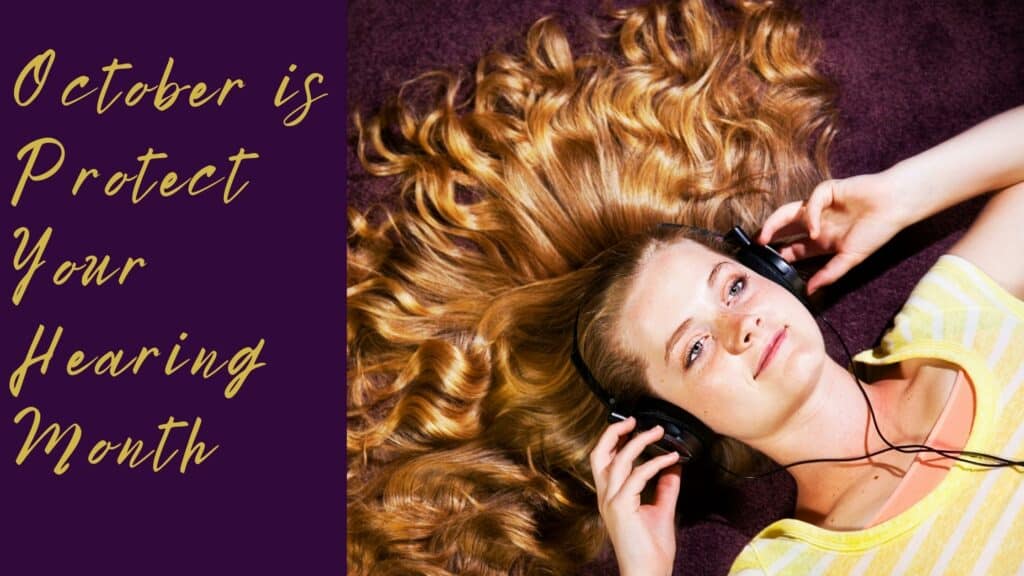Have you ever caught yourself in a setting where you have to yell to be heard? Have you ever gotten so immersed in the music playing on your iPod you don’t remember cranking up the volume to its loudest? Chances are, you’re like most people and have accidentally exposed yourself to dangerous noise levels. This October, Protect Your Hearing Month is working to raise awareness and encourage prevention of noise-related hearing loss.
Noise and Your Hearing
At some point, you’ve probably heard that loud noise can be dangerous to your hearing, but how exactly does that work? Noise-related hearing loss is directly tethered to one of the smallest, most sensitive components of the auditory system. Within the inner ear, tiny “hair cells” line the walls. These cells are poised to react to incoming vibrations from sound waves entering the ear. These hair cells are so finely tuned they can pick up a whisper or approaching footsteps. Their sensitivity is also their weakness, however.
While hair cells can detect very soft sounds, very loud sounds can permanently damage them. Very intense, loud sound waves hit your ear’s hair cells like extreme weather. Some sounds stress hair cells to the breaking point instantaneously, while lower volume can cause the same havoc if sustained for minutes or hours. The worst part is, our hair cells can’t recover from damage. Our body has no way of repairing or replacing these essential cells, so when we lose them they are gone forever, leaving a gap in the way we hear.
The fewer hair cells we have a functioning, the less nuance we can perceive in sound. This is noise-related hearing loss. Speech will begin to sound muffled and mumbled and it will be hard to detect very high or very low frequency sounds.
While most people assume that hearing loss only happens to older adults, the truth is that the hearing loss we see in older people is the accumulation of all the hearing damage acquired during a lifetime. That is, hearing injury happens whenever our ears are exposed to dangerously loud noise. The more noise damage our hearing sustains, the quicker we see signs of significant hearing loss, regardless of age. New studies are showing that a shocking 17% of Gen Z already has some degree of hearing loss.
Recognizing Noise
A big part of protecting your hearing is recognizing and avoiding loud noise that can damage your hearing. Our hearing is capable of safely handling noise up to 75 decibels (dB), about the sound of a vacuum cleaner running. Sounds above that threshold have the capacity to permanently affect your hearing. Loud sounds are like a storm that your hair cells have to withstand – the louder the noise, the quicker it will inflict damage. For instance, 85 dB – about the sound level of a residential lawn mower- will damage your hearing in 8 hours of continual exposure while a sound at 120 dB – like a gunshot- injuries unprotected hearing instantaneously.
In between 85 dB and 120 dB, safe exposure time to sound drops exponentially. The sound of a motorcycle, around 95 dB is only safe for 1 hour of exposure. A live music concert projects sound around 105 dB and cause permanent hearing damage in under 10 minutes.
Protect Yourself
Consider these limits when setting the volume on headphones and earbuds. While your device may allow you to listen to volumes that mimic a concert or movie theater, your hearing cannot handle these noise levels. Instead, make healthy listening a habit. Set your volume to the lowest level where the sound is legible.
If you live or work or play around with a lot of noise, you’ll also want to start monitoring the environmental sound you are being exposed to. Sound level apps can turn any smartphone into a decibel meter to easily track when your surroundings require hearing protection. When possible, avoid loud environments and when leaving is not an option, wear hearing protection.
Have hearing protection on hand. Earplugs and ear muffs are both easy ways to reduce sound exposure to safer levels. A pair of reusable custom earplugs is a great investment in effective, comfortable hearing protection, especially for people who often find themselves in loud places. By protecting your hearing from noise-related damage, you’re keeping your sense of hearing healthy and intact.





